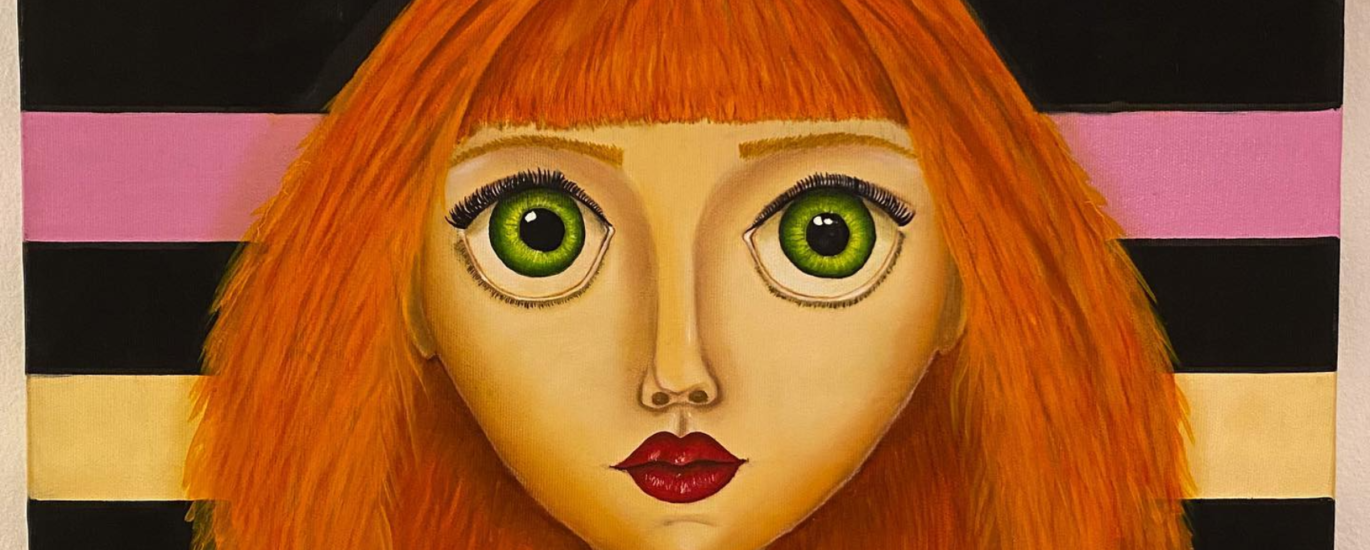“we are all victims of this system, of the weight that our roles are predefined”
Amy is joined by Myriam Ben Farhat to discuss her experience of patriarchy and gender roles in Tunisia and Spain across her careers in law, art, and beyond.
Our Guest
Myriam Ben Farhat
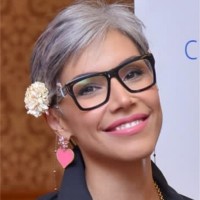
Myriam Ben Farhat is an entrepreneur, originally from Tunisia. She has two master’s degrees, one in financial and public law, and one in contemporary art. She also studied professional coaching and got her certification from the International Federation of Coaching. In 2020, Ben Farhat joined the Play Magnus Group to become chief people and culture officer. When the company was acquired in December 2022 by Chess.com, she became Head of L&D and DEI, and currently leads the “Chess is for everyone” initiative.
The Discussion
Amy Allebest: At the beginning of Season Four I dedicated my work this season to all of you listeners who had ever encountered patriarchy and had to struggle to overcome sexist systems, often alone, without support. It was really moving for me to imagine so many different people, in so many different circumstances all around the world fighting similar battles and overcoming similar challenges. Today’s episode demonstrates that beautiful, painful truth that just about everybody just about everywhere has had to deal with patriarchy, and we can learn so much from listening to each other’s stories. So here to share her fascinating story with us is my friend, the incredible Myriam Ben Farhat.
Welcome Myriam.
Myriam Ben Farhat: Thank you, Amy! I’m really super excited to be here and really honored to be part of this. I’m a big fan.
AA: Oh, thank you. I’m so excited to have you here. We’ll start as we do every episode with your professional biography, so I’ll read that really quickly and then we’ll launch into your story from there. Myriam Ben Farhat is a professional certified ICF coach and head of learning and development and DEI leader at Chess.com. Myriam is a single mom of two girls living in Barcelona, but she’s originally from Tunisia. She got her master’s degree in financial and public law and joined the Tunis Bar in 2005. In addition to working as a tax and business corporate lawyer for 16 years, Myriam owned, with her ex-husband, a popular restaurant in Tunisia. And Myriam, how do you pronounce the name of that restaurant?
MBF: It’s TAM TAM Sidi Bou. Because Sidibou Said is a very famous, cute village, which is UNESCO classified, so it’s Tam Tam Sidi Bou.
AA: Oh, fabulous! I understand that you were involved in the creation process of that restaurant and the organization of private and corporate events for up to 500 people, so it sounds like it was like a cultural thing too.
MBF: Uh huh!
AA: I love it. Myriam also co-founded the Pangaea Shipping Group, a group of companies in the shipping business, with her ex-husband. Myriam led the legal and HR departments with great involvement in business development. She moved to Barcelona in 2017, got a master’s degree in contemporary art, and had several exhibitions as a feminist artist. Through her art, she developed a passion for empowering women and supporting minorities for equal opportunities. To fulfill her need to support people’s growth to reach their higher potential, she studied professional coaching and got her certification from the International Federation of Coaching during the lockdown. Myriam then started professional coaching for women entrepreneurs and leaders. In 2020 she started working for Play Magnus Group, that refers to Magnus Carlsen, for those of you who know chess or maybe don’t, as well. She was the Chief People and Culture Officer at Play Magnus Group. She created the company’s HR department and put the focus on improving the growth of the female workforce and female leaders in a double challenging environment: tech and chess.
The Play Magnus group was acquired in December 2022 by Chess.com, where she now occupies the role of head of L&D and DEI, leading the Chess is for Everyone initiative. Myriam, that’s a really intriguing and impressive biography, and this episode is basically going to be an exploration of gender norms and patriarchy through the lens of your personal story and your lived experiences. Why don’t you take it away? Maybe you can start with your childhood in Tunisia. And to set the stage, we actually might need a little geography refresh of where Tunisia is, and just tell us a little bit about where you’re from.
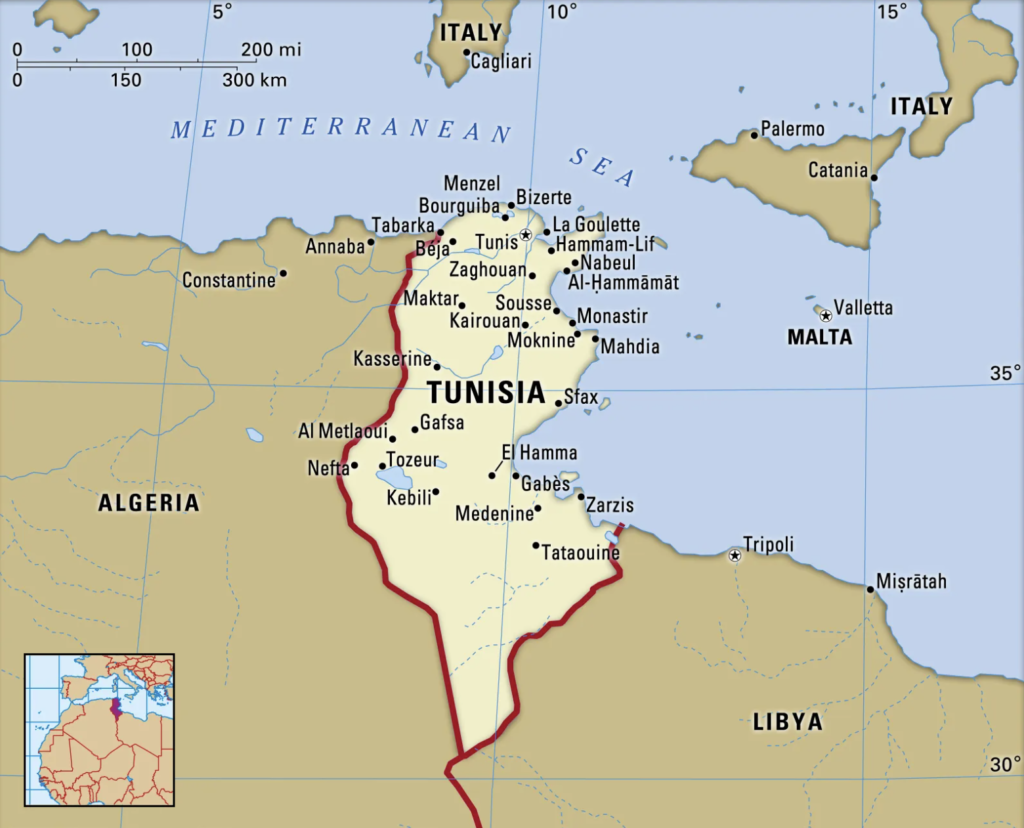
MBF: Sure. Tunisia is in North Africa, close to Algeria, Morocco, and Libya from the other side. It’s a Muslim, Arab, African country, so it’s a very interesting mix because we know a bit how to put people in categories. In terms of women’s rights and position, for the Middle East, Tunisia is quite an original one. It’s really very advanced in women’s rights, actually. So you will know a bit about my story. I grew up in Tunisia and I was the eldest. I come from a middle class family. From my mom’s side, quite conservative, from my dad’s side, a bit more open. Religion wasn’t really very present in our life, but it’s there. I think social codes were more present, now, after removing so many of them. We are raised to be the perfect little girl. Our education is really, like, when you are born a girl, we know what to do with you. And if you are born a boy, we know what to do with you. And it’s completely different. It’s as simple as that.
As a girl, you are raised to be the perfect little girl: neat, beautiful, clean, obedient, suppressing your feelings and emotions. I’m doing it maybe a bit extreme, but when we reflect back, it was really that sense. Like, better not get dirty, don’t play with balls, you know, play with dolls. All these things. We are already in a role that we are put in. So, I did the job pretty well. They taught me to do things and when you do it, you do it well. And we have this from childhood. What’s very interesting in Tunisia is that education was something super important. We educate girls. I should maybe put some history here. Tunisia was colonized by France, and in 1956, when we had our independence, the Tunisian president, Bourguiba, was a big feminist. And women have had the right to vote since then. Abortion, we had it in ‘73. Going to school was one of his priorities. Education was one of his priorities. We have quite a high literacy rate in Tunisia, and women are really on a high level of education. We raise girls to be educated, to be competitive, to achieve, to perform. There is almost no ceiling at that level, except, of course, when it’s a poor family and they have to make a choice that the girl will go to work to fund the education of the boys. That’s maybe the little twist we have in our country. But today, the rates are just incredible. I can share with you some numbers I prepared here. In STEM, 58% of Tunisian people with diplomas are women.
AA: In STEM?
MBF: In STEM. 45% [of STEM diploma holders] are working women in STEM, and 50% of researchers are women. It reflects what my generation got in education in our childhood, and it’s going higher and higher every year. It’s really impressive. So, that’s about education. And I remember my father, when I arrived home after an exam and I would say, “Hey, I got an 18 out of 20 in math,” and he would say, “What’s the high score?” And I was like, “19.” “Who got that?” And I would say, you know, “a boy” or “a girl,” doesn’t matter. And he would say, “Okay, so you can do better.”
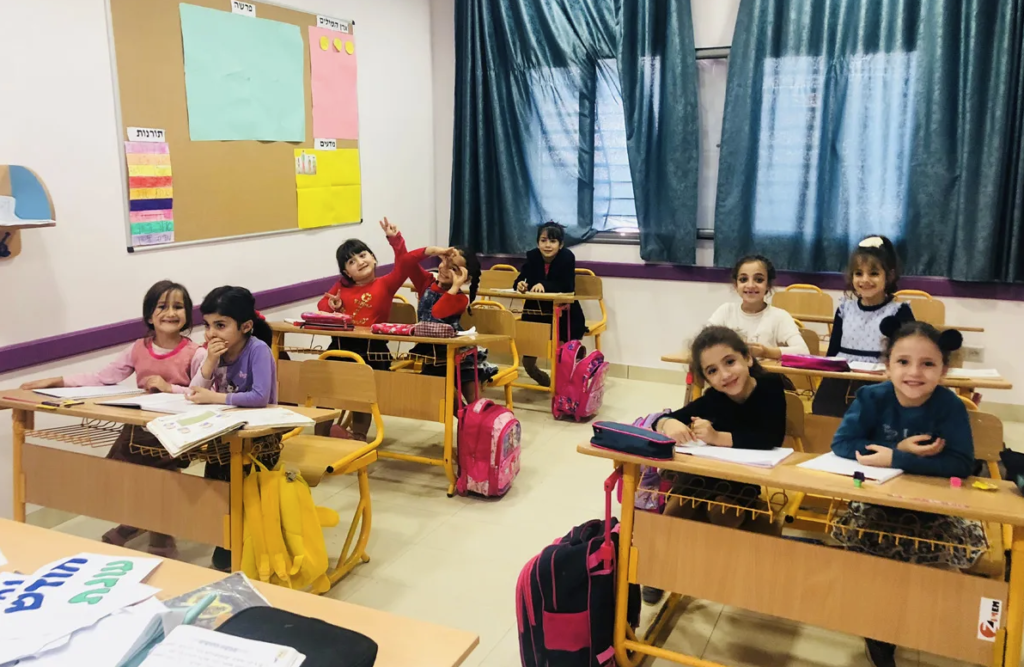
AA: Wow.
MBF: Yes, yes, yes. As I told you, it doesn’t matter whether it’s a boy or a girl, we have been raised thinking that there is no limit at that stage. And the funny part comes after, because we are raised as a perfect little girl for one purpose. The final destination for girls is to get married. When you have a little girl, what you hope for her with the best intentions, is that she gets married to a good man. Wealthy is better, of course, so you secure the future. But we are raised to be the perfect wife and the perfect mother. That’s the final successful destination. So, it’s very weird. We raise you to be a performer in high education, et cetera, but then the ceiling arrives way later. It’s super interesting because you’re good, you go work, et cetera, but you can’t be better than the husband. Not too high-level in salary. All of it. Position, hierarchy, all of that. Unconsciously, we almost limit ourselves at that stage. You know, what I want for myself. First, I see myself as a good wife and an amazing mom. Everything is around that.
AA: Would there be a stigma against a woman who made more money than her husband?
MBF: Of course.
AA: I mean I can relate to that.
MBF: Yeah, yeah, exactly. There are exceptions, of course, but no man would like to marry a woman who is already so powerful. No one. This is not attractive. We are raised to be attractive, you know, but not sexy, not too much. There’s a saying in French that says “Sois belle et tais toi,” which means “Be beautiful, but zip it.”
AA: Oh yeah, okay. I kind of love that. But I can very much relate to everything you’re saying. This seems very familiar and kind of what we deal with in the United States as well.
MBF: I know. We discussed before how patriarchy… is it through a religion, through a society, through family? But from my experience, and one day I awakened to that matter and I started reading and talking and I realized that it’s not because of my religion. It’s not because of my country. It’s amazingly international, and whatever the religion, the topics are the same. The issues are the same. It’s really a human topic, I would say, not really related to these layers. One other thing is that we are raised to be a woman, an amazing wife, an amazing mom, but we don’t choose. We will be chosen, and I think that’s also international. Now things are changing, but it’s always a man who will ask for that.
When parents are educating, they’re doing the best to have the best product on most of the market, let’s say. I love using this, it’s exaggerated a bit but it’s really that. Because after, you will be picked and then you will have the choice to accept or not. But it’s not you who will be making the choice somehow. That’s the mentality around that: education, education, high potential, but then boom. But we also put it on ourselves. It’s all normalized. The definition of success, what’s a successful person or a woman, would be the woman who will be having a good marriage, raising her kids, and having a husband who is happy and successful. That’s the real responsibility on our shoulders. And again, I did a good job somehow! But after a while I realized that maybe it’s not that fulfilling. And you ask yourself questions about why this is not that fulfilling, what do I need more, you know? And all this happens on several levels.
There’s a saying in French that says “Sois belle et tais toi,” which means “Be beautiful, but zip it.”
So that’s my childhood education, my background, how I was educated. I studied in the French school, which was also more open-minded, of course, and open to a wider range of ideas actually. I was exposed to more European ideas. And then I chose to go to law school. I wanted to be a lawyer. That was very deep, I knew it since I was maybe 14 years old. It’s because of fairness. That’s one of my biggest values, fairness, as simple as that. How to bring justice to people and how to protect the weak. That was my choice since I was a kid. And I went to law school and I started working as a lawyer, and then of course, like a lot of people, I was very disappointed. You start as an intern and have a two-year internship, as a lawyer it’s obligatory, and you are not paid. And the only way is when the government, when commis d’office, they appoint a lawyer for people because they don’t have money to have their own lawyer. And my first case, I was in the court with my black dress and the white thing for the lawyers, and I was excited to have my first case, and it was a guy who raped a girl. I was like, “I can’t. I just can’t do this.” I gave it to the people close to me, and I knew that day that I wanted to be a good lawyer, but not in the sense that you have to defend the rapist.
AA: You were the defense lawyer?
MBF: I had to defend but I just couldn’t. So I knew from that day that I needed to switch my law practice and I focused more on business and helping people. You know, it’s always the same. I did a lot of things but I always had one line the same. I think we all have a mission in life, but it can take different mediums, like an art. It was how to open possibilities for people who want to achieve things, who are entrepreneurs, who dream to make their project. And I love making this happen through my being a lawyer for them and opening doors of possibilities. So, I did that for 16 years. In between, with my ex-husband, he owned a restaurant. In the beginning I was getting involved, and I loved that. That’s also a very interesting experience as a woman, being in the kitchen of a restaurant. It’s an experience, I can tell you. Oh my God. I learned a lot through all these phases. It was a weird environment having a woman there because it’s all about swearing and it’s super masculine. Me being there was a big challenge for them. For me too, it was super intimidating, but I tried to navigate that. And I learned how to navigate, I learned how to open conversations and build trust, and it changed the whole environment. I was super proud because the last year before we sold the restaurant, we had three women in the kitchen also working. They were hired and they became a team, but it was very masculine before that.
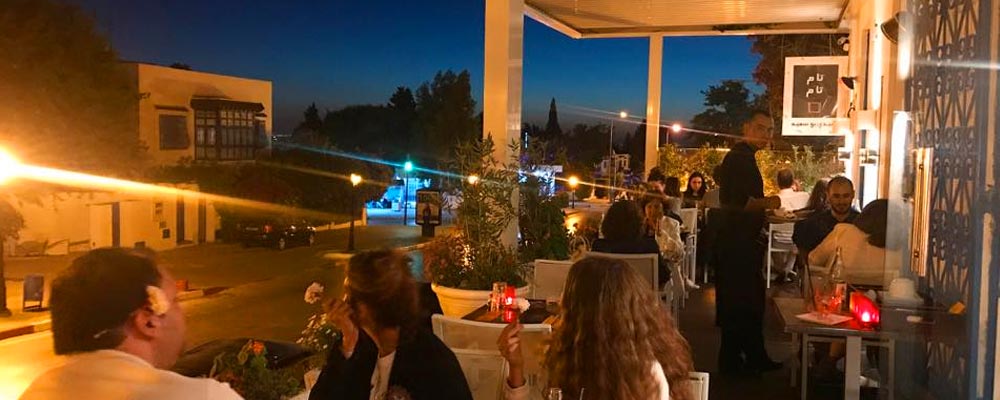
AA: I want to point this out because I think this is so interesting. I know this is a tangent, but isn’t it interesting how the kitchen environment is traditionally a feminine space? In every home it’s the mom’s job to cook, and she’ll have the daughters come and train to do that unpaid labor. The family is women’s work, but as soon as it becomes a professional realm, then it becomes masculine. Isn’t that interesting?
MBF: It is!
AA: If there’s going to be a boss of a professional kitchen, then it’s a man, and I think that’s true in a lot of different realms. You think of women as teachers, but then who are the principals of the school, or the professors at the college, or the university president? Then it swaps and this realm that is considered feminine, if they’re going to get paid a lot for it then it’s masculine.
MBF: Because it’s a leadership role. Definitely when it’s professional and there is money, it switches completely. I love the comparison. Totally. Talking about work and experience, when I was going through the bar of Tunis and I was the youngest person doing the ceremonies becoming a lawyer of my promotion at that time, it was a really, really big challenge working in the court as a woman. Even though we have a lot in Tunisia, as I shared, I had to change so many things in my natural behavior. I needed to change my way of dressing, that’s for sure. I had a full suit just for when I go to court, much more masculine, like the black shirt that’s really wide, hiding all my femininity. And making sure that I’m not attractive. I knew that I needed to have this as a weapon to be respected, to be taken seriously. Also both ways, it’s something that has been very present in my life. I was always on my guard if anything would be provoking sexual harassment or a sexual interest. I was always behaving to make sure that I don’t set any door open to that and so that I would be taken seriously. But it’s a heavy weight. When you are finally in a safe space, you realize that was a really heavy weight.
AA: Yeah. Is that something that girls are trained to do from the time they’re little, taking on that burden of being responsible for how you’re being perceived by men? Because I know that’s certainly true in my culture.
MBF: Oh yeah.
AA: I mean, being raised in the United States, a large percentage falls on the girl or the woman to make sure that you’re not being provocative.
MBF: You are responsible. A hundred percent, as simple as that. At least I always felt like in any situation, I could not even go and say “this happened to me” because I already felt guilty. Even small things, you know? I know the answer will be, “Oh, but how did you behave? What were you wearing that day?” It’s definitely a weight on our shoulders.
AA: I was going to ask you earlier about the norms of sexuality, maybe even back to teenagers. What are the social codes that you grew up with regarding sexuality?
I was always on my guard if anything would be provoking sexual harassment or a sexual interest. I was always behaving to make sure that I don’t set any door open to that and so that I would be taken seriously.
MBF: Taboo. Totally taboo. 100% taboo. Virginity is the thing. I was joking earlier about how we need to bring the best product on the market for marriage, but it has to be untouched. That’s a hundred percent ruled, it’s coming from religion but it’s also coming from the patriarchal society, you know, like it’s ownership. It’s the notion of the woman object, as I said, the product and the possession. If it has been touched or possessed for whatever, it’s not interesting anymore, it cannot really be mine. It’s something very interesting because, as I told you, I followed the rules by the book because I had been trained to be a high achiever. But those things, like how to dress and the more personal field, the education, I was always a bit challenging the codes. It was my way to finally express myself somehow.
For example, the topic of virginity was something I didn’t understand. Why? Because in my country, for men, we congratulate them. And boys, we are super proud of them. The more sexual relationships they have, the more they are men and congratulated and admired. You know, he had a relationship with this and this and this. And for girls, it’s completely the opposite. The girl is destroyed. Her reputation, her future, et cetera. It’s unbalanced, which is completely unfair. I remember I was always saying, “But those boys that you congratulate, they have sex with who, if it’s not girls?” Haha! I remember that I was really young when I started thinking that and seeing it around me. I knew that it’s something I wanted to get rid of, my virginity. I remember very well. It wasn’t something like a love story. Yes, it was someone I loved and I had trust in, but I made the decision that I needed to get rid of this weight. So I made sure to remove that filter for marriage so that the person that will be interested in me will be interested on a deeper level towards my personality than having this guarantee of possession. That was something in my mind, like I needed to get rid of this as simple as that.
But it’s super taboo, and I remember that I didn’t even share that with my best friends. I kept it for myself because of the taboo, Amy, it’s one of the stories that I probably never shared. I only alluded to it. But from that relationship, I got pregnant. Straight. My first time. Of course, because it’s taboo, because we don’t talk about it, because we keep it for ourselves. Of course the worst happened, and the worst was that I had to deal with it by myself. I was 19 years old, still a minor, so I couldn’t get an abortion without the permission of my parents. And of course, asking them or telling them wasn’t even an option. The funny story there is that when I hear debates today about abortion, yes or no, for us girls in my situation at that time, you don’t even think of the option of keeping it because your life would be destroyed if you had a baby out of marriage.
It’s super weird as a situation where we place ourselves in that field. At the performance I did with my art, I talked about it and a friend helped and directed me to a doctor who would do this for minors. Which, of course, he’s a savior somehow. He saved a lot of girls and their futures, for sure. But I remember, and it’s a trauma you keep, it’s a stamp you keep. After having the act of abortion with medicine, I remember I was going down to get dressed and he gave me a slap on my back, telling me “petite salope,” which means “little whore” or something like that.
AA: The doctor?
MBF: The doctor. And every time I tell the story, I am just like… You know what? 15 years later I was in a restaurant having lunch with my kids, actually, and I heard his voice. My heart was about to stop and I needed to leave the restaurant, as simple as that. Because you know, we are weak. We are ignorant. There are no words. He did it, he’s doing it, and he’s saving lives, but he couldn’t help himself over this judgmental harassing. I cannot even describe it.
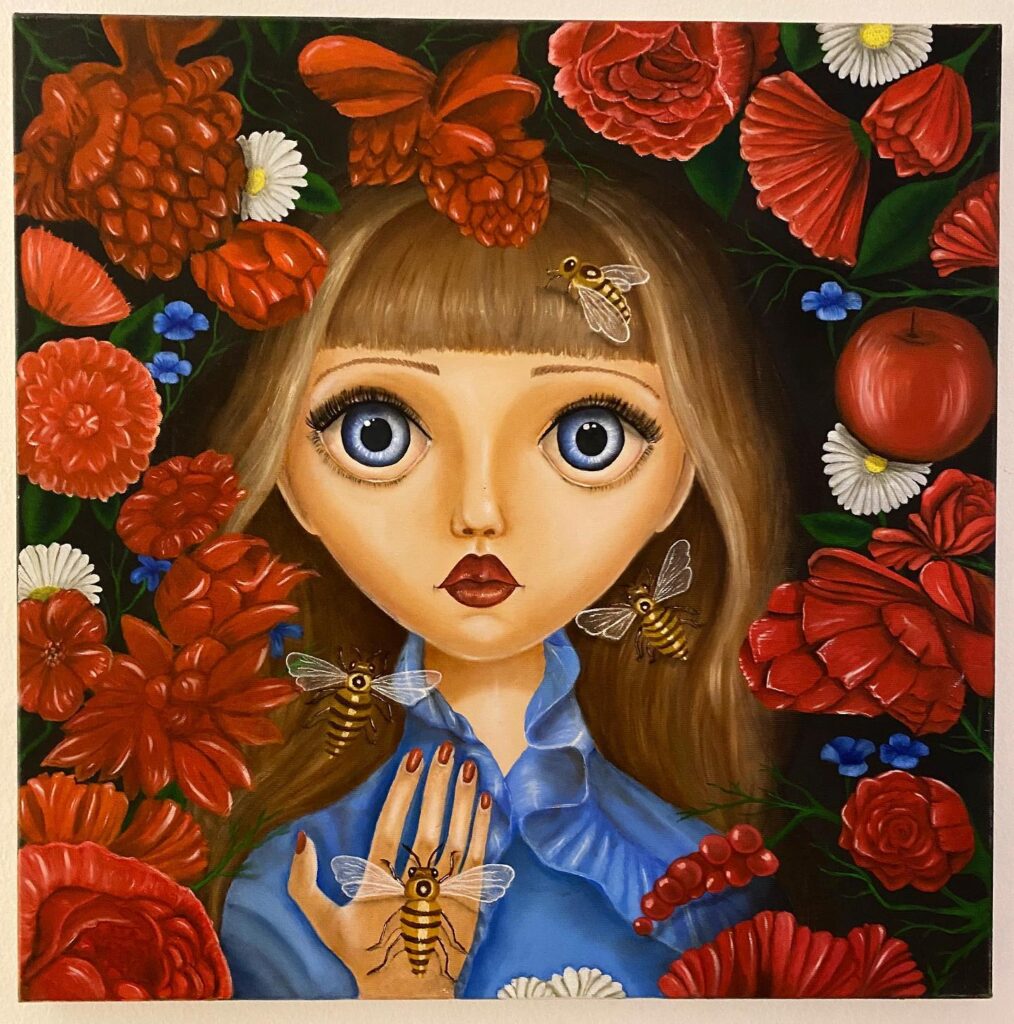
AA: I’m so sorry.
MBF: You know, I’m here today. And why I’m here today and why I’m sharing this, I’m finding the bravery to be vulnerable and share these kinds of stories for another girl in the same position who will hear that this is not okay. Even just one person, knowing and hearing that this is not okay, and you have to react and don’t accept it. That’s it.
AA: Did you ever tell your parents and did you tell the father of the child? I’m just curious. Did you have any support at all or were you all by yourself?
MBF: No, I was all by myself. I remember that night it was terrible because I had a lot of things happening in my body and it hurt, but I needed to hide that pain. I have a flashback now talking to you, I have a very clear flashback. And that’s the result of a system, the result of a very deeply built mentality, which is so far away from what religion is or what kindness is, you know, what we are here for. What’s also interesting about a pregnancy is that after the abortion, you know, after marriage I was super happy and super excited about having my first baby. And the shock of what happened after and how I really perceive things, you become an object again. It’s so obvious that you don’t have the right to decide what’s for your body. Everybody has a say about what you should do, what you should eat, how you should walk, how you should sleep, how you should act, how you should work. Of course, stop exercising. Oh, don’t do that and do that and do that. And everybody, even people you don’t know in the street will have a say about how you should be behaving. And this for me was one of the big hits that made me think, “This is not okay.” I felt really violated in how I’ve been living. It’s already a huge change in our body and everything. I don’t understand what’s happening to me and it’s hard, and you have to decide not only for you, but for someone else who is inside you. And you have all these people having a right to say something that’s for me. It’s amazing. It’s something that’s worth talking about.
And also for breastfeeding, how it’s idealized, so if you don’t want to or you don’t like it, like I wanted it but it was so painful. It was something my brain couldn’t accept. It was really rejecting this, it was so painful. And I think so much dependency made it scary somehow, you know, I was stressed about not doing it well. Again, everybody has a say on what you should or shouldn’t do, and it’s unbelievable. We would never see someone saying to a father, “Oh, this is how you should be as a father.” I never heard that. So yeah, that’s an interesting relationship with our body and pregnancy and how society gets to say they own your body, you know, at that time they have more rights on you somehow.
AA: I’m curious, then, when in your timeline you met your ex-husband, and how did that whole process play out?
MBF: Well, he was someone very open-minded. We shared a lot of things together, and he’s very ambitious and really out of the mold somehow. So I was excited about that because we were not coming from the same environments. Also from my family’s side it wouldn’t really be accepted, but I thought a bit about it and we were aligned on building things together. It was a choice, a hundred percent choice. When you get married, you know, you have a lot of things happening and a lot of disappointment and a lot of frustrations, and we say this, I love the saying, “what your spoon gets, that’s it.” That’s what you have to deal with. So that’s how we navigated it. I had my first child and then I had my second child, and I remember I was super happy, praying to have a girl. I didn’t want to have a boy. I was super scared to have a boy because I wasn’t sure that I would be smart enough to educate him the way we should, not to be macho. I was super scared to not be good enough because of the environment where I was raised. It’s so deep in all of us and in me, even though I started opening my eyes and being awakened about a lot of things. I wasn’t sure that I would be providing the right education that I would be happy to have. Hey, I’m bringing a human being into the world that will be a positive addition, you know? So, I was lucky. I had two girls who became my strength after.
And I knew that one day I had to make the choice about investing in my own career or investing in our family life. When I say family life, it’s also the career, you know, the professional side. That’s why I say that we built together, like with the restaurant, with the shipping business. And I remember very well one day I was crying, we had a fight and I was like coming late from my law office, and I was like, “No, I know what I want. I want to build this together. So I’m going to invest and let’s do it together.” But while doing it together, I know that I also chose to be in the shadow somehow. Whatever I was building, I was fierce and had a lot of ambition and a lot of hard work, because it’s for us, it’s for the family. I’m someone who never cared about having recognition or having public rewards. I’m fine with it, and I was super happy to see him collecting this and he was proud. For me, it’s like, I’m contributing to his happiness and his success. It’s a very funny situation. I think a lot of women decide to put their career aside for their family and for their husband. That’s the classic scenario we see. So I did, but while working super hard too. After the divorce, I really lost everything. Then we moved to Barcelona for a better life for our kids.
AA: Can I ask quickly, when you say you lost everything, was that financially too?
MBF: Everything.
AA: What were the laws like? Is there equal protection for women under the law if there is a divorce, or how does that usually go?
MBF: Oh, you know, I’m a lawyer, but that was the one of the hardest times ever in my life. When we decided to go through the divorce, we were here in Barcelona, Spain. Things were happening. It was a huge fight. Divorce is always sad but mine was really ugly, really, really ugly. I have been arrested for kidnapping my own kids. My parents have been sued for money laundering to put pressure on them to bring me back. It was a dirty one. A lot of great things came from it, but during that time, the three years of divorce, it was really hard. It was really hard. When we moved here, he was setting up a company while having a company there, and we needed to have residency so I registered to study. I was in the art school. And I was there, I had the paper, I’m going to commit, I’m going to do it. I wasn’t able to work as a lawyer when I moved here, so I was studying while, you know, adapting with the kids.
And all the problems started. I remember when I started talking, you know, we women often are silenced and we think that what we feel is not valid and it’s shameful, so we don’t talk. We don’t share even the hardest things. You keep them within you because you feel like somehow you’re responsible and you need to fix yourself. And when I was here, probably the freedom of not knowing the people before, I started making some friends who are today my support system, my sisters. And I started sharing, “I’m having these issues with my husband and this is happening,” and I saw in their eyes that something was not okay. I started feeling that, “Okay, it’s not me that is completely to be fixed,” and I was recommended to see a therapist. I remember at the end of my session, he told me that I was a victim of domestic violence. And I was like, “Oh, no, no, no. You don’t get it. He doesn’t beat me at all.” He told me, “Yes, that’s worse. It’s verbal.” It was a big a-ha moment.
And I’m not even blaming him. Today, I’m really not blaming him. I see that I was a victim, but I think we are all victims of this system, of the weight that our roles are predefined and how we have been taught what we should be. So the divorce started and my big discovery was that the government and the justice institution that are here to protect us became my enemies. As simple as that. When I’m here in Spain, I was confident about my rights, even though in Tunisia women have had the right to divorce since 1956, there’s no polygamy, it’s quite advanced. The problem is not the law, the problem is the mentality behind the people who are applying that law. And I saw my ex-husband’s lawyer, a very famous one, writing about me, and he said, “She is an artist and she became a feminist guru to her little daughters, educating them in the wrong way. And they are losing these two little girls that we need to protect.” The judge asked that I have to be assessed psychologically. Oh yes. That was also a big hit that I got.
In Spain, because I’m studying art, I made some pieces of art that made me not deserving of being a mom, already having this rhetoric: “Oh, she’s dangerous for these little girls.” I had so many of these things and I didn’t expect that. When it comes from the institution, or the person like the doctor, who are here to protect you, that was when I didn’t have my guard up and I got the biggest hits on the face, as the same day when I was arrested for kidnapping my own kids in the airport. I had a policeman investigating my parents and he was telling my dad, “Tell your daughter it’s nothing. The case has been invented.” And he told him, “Tell your daughter to come back to Tunis, drop off the kids, and go with her husband” – because we weren’t divorced at that time – “to this fancy hotel, spend three days, and everything will end. This would not even exist.”
AA: Gosh.
MBF: These people think I am the crazy one because I asked for a divorce because I started saying no to things that didn’t work for me, that were hurting me. And I decided to take my life into my own hands and to decide what I wanted to be and what I wanted to do. And all the people who stood against that, it was insane. It was really insane to see this judgment, already having these thoughts like, “She must be crazy. She must be hysterical. She should be having treatment” and all of that. So yeah, that was a bit of the divorce, a few anecdotes that show patriarchy everywhere.
AA: Yeah. It seems like what you’re describing is that sometimes people act in such a way that everything’s friendly on the surface, and like you said, sometimes the laws have changed in a progressive way so you think everything’s okay. But if you break that expectation of like, “No, we made it this way for you, so you better be grateful and stay where I’ve put you.” And if you challenge that, it blows open the facade and this misogyny sometimes comes raging out and you’re like, “Whoa!” Maybe you felt that or you’ll sense it a little bit. There’s this ugly undercurrent, but everybody’s acting so nice and like everything’s better, and you just challenge that assumption of subservience and the dragon comes out. You’re like, “I knew it! It was still under there!” Just that expectation that men do still control women and then they go crazy.
MBF: Oh my God. It’s terrible. I saw the ugliest faces, you know, it’s terrible. And of course, the ugliness brings the ugliness out in ourselves when we are aggressed that way. I am very grateful that I was into art at that time because this is what healed me a lot. I was doing my catharsis, I was vomiting my anger through my artwork. And I remember having women coming to me and telling me things like, “Wow, how you say it, how you share this,” oh my God, it made me cry. I received so many messages from people from Tunisia and from here that this was okay. At least there is something from this suffering and from the pain, something beautiful is coming out of it. Beautiful, not in the aesthetic of making artwork, but something like moving emotions. And the most precious thing I’ve seen is when someone will feel that they are not alone. That’s it. It’s really a life-changer when we have that feeling, and you will start believing in yourself. And you start feeling, “Oh, okay, I’m not the one to be fixed. I’m pretty okay.” You start that healing process bit by bit, and that’s beautiful.
AA: That’s wonderful. How did you recover, Myriam? I love hearing these stories about therapy through your art and healing and recovering through your art. What are some other ways that you moved forward after the divorce?
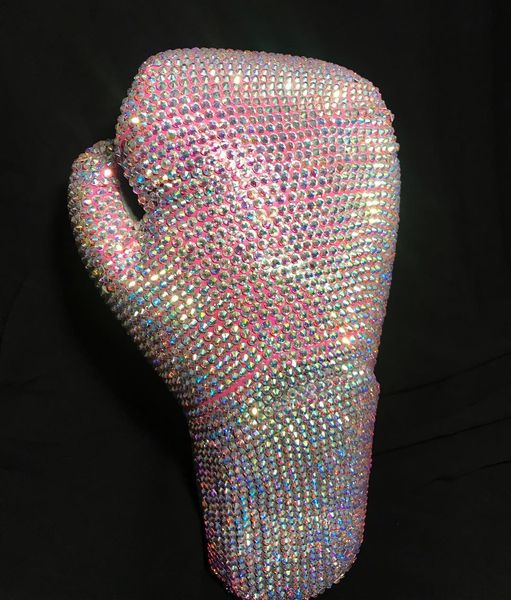
MBF: As I told you, Amy, I really lost everything. Because my ex-husband stopped any child support or paying anything, and my savings were limited. Even my kids were expelled from school and I reached a point where I remember one day I had like 687 euros in my bank account. I received an email from the school that I would be sued because of the unpaid bill, because he stopped paying the school. And with the end of the month coming, the rent, everything, I had three seconds in my life where I touched the button and I wanted to let everything go. And then, you know, “Okay, let’s try again. I have nothing to lose. I’m not going back there. I’m not going back under his feet. Let’s keep trying.”
And I remember I was 40 years old when I had to sit down and write my first resume. Because with art you cannot make money. You cannot feed kids, you know, it doesn’t pay the bills. So for me it was really like a failure, because my message and having those values was a bit utopic probably at that time. And my message, and this is my mission in life, I started the training of coaching. I was passionate about it. As I shared, I was leading our HR people, we had more than 120 employees that I was leading in Tunisia. So it’s really something I’m passionate about and I’m doing it towards the people side. I love discovering their strength when changing them in these positions, et cetera. So I said, “Okay, during COVID let’s take the certification that will help me.”
And to be very honest, art was great to express, but it doesn’t fulfill my need to help people move forward. I love awakening knowing that I push people and I help them have wings and open doors of possibilities. That’s why I love coaching. So when I started, I wrote my resume for the first time. I used to be the one checking resumes and hiring, so it was super, super interesting in the very hard times. I took it first as a failure and really going down, down, down from scratch. But I was ready even to work as a housekeeper and keep trying before I gave up. I sent my resume to a few friends and said, “Okay, this is all I’ve done. What should I ask as a job?” I did so, so many things. I didn’t know what to look for. I had a few friends who told me, “Please, please don’t send it. We are hiring and I would die if you would work with us.” One of them was a client and I was his lawyer. And another one was Andreas at Play Magnus Group. He told me, “I know at Chessable they are hiring but please don’t send it. Go meet with David Cramley and talk with him and see. We are hiring a lot of people, a lot of young leaders, and I’m sure we will need you there. And we need more women.”
And I had another offer, but this one, you know, the women thing, the chess, the tech. I felt I would stay connected to my mission, actually, that I love the challenge. I loved being there knowing that that’s their intention. They want to do that. We want more women into the chess world as customers, but we want more women internally and we will need your support for that. So for me that was super exciting, but I thought for sure I’m not getting the position where I was before or the financial income that I had before, but that’s super exciting. Let’s start there. I started first as a coach at Chessable, coaching the leadership team and the future potential leaders. And bit by bit, I finally created the HR department and the team. It was a very, very exciting time because I saw our women growing and I’m happy and proud and with a lot of humility that I contributed to that. It’s so fulfilling. It’s so fulfilling. And now today, what came from all this, the divorce, losing everything, being here, I think we are all victims some days. There is one difference after: we decide to stay in that position, or we decide to move on. But we need to recognize that yes, we have been victims. Yes, we recognize it, but I’m not staying in that position. I’m taking all this luggage and I’m going to do something with it. All this energy is really bubbling, bubbling, bubbling to build on a positive side, and not into anger or revenge or destruction. Not at all. So all that was really invested in the chess world, and it’s my life now. It really is my life and it’s super fulfilling.
AA: Yeah, there have been some really exciting developments in the world of chess, and specifically for women in chess. Can you talk about that a little bit?
MBF: Yeah, sure. It was International Women’s Day a few days ago and I am full of positivity and optimism. Since I’ve worked in the chess world, every Women’s Day we celebrate it through a tournament. And just the evolution, you will understand that there is progress. Even in our own minds today. When we did the first version at Play Magnus Group, it was an only women tournament. We had a big talk with Judit Polgár and with Juga, she came and performed her song. And the topic was pointing out all the unequal situations, and I wouldn’t say complaining, but yes, this is unequal and all the things that women are facing, all the difficulties we are facing, and we’re somehow not seeing hope. So that’s the situation. And of course, Judit is inspiring, that’s why she is a role model and that’s why we bring her to be able to talk about these topics, but still with some hope at the end, seeing her just being her. The second year was almost the same but the tournament was three women’s [competitions] and one men’s.
Last year was a big year for the chess world. It’s the #MeToo. Jennifer Shahade broke the silence. And as I shared earlier, from my little tiny experience, the day I spoke, everything changed in my life. It’s not being alone. And when she spoke, she opened Pandora’s box. It has been the heavy weight on the chess world that has been silent all these years. And the stories I personally knew through the women in my team, the women who were competing, and the women who stopped playing because during the night of a tournament the director knocked to go into her room, all these stories. I heard so many of them and I was shocked, of course, because we don’t know. It’s unspoken, it’s not shared. So I think Jennifer Shahade really made this huge change today. Last year we had her on another round table and we talked a lot about the sexual harassment and all these issues. This year, I’m super happy because we were sharing about the progress that we’re already seeing at our round table. It was about all this progress we are seeing and it was much more positive. There was a switch, definitely, and much hope and progress is definitely here. So I’m quite optimistic and we see new faces, you know, Amy. The mother role is super important, and we always had Judit Polgár, she is a role model, but I’m super happy today to see so many new, young faces. Thanks to the internet, thanks to these creators and videos and accessible information. And yeah, the world’s here, you know? Go get it. That’s beautiful to see. It’s more normalized, somehow. And they are getting that, they are taking that space.
I think we are all victims some days. There is one difference after: we decide to stay in that position, or we decide to move on.
AA: I’ve seen a lot on the Chess.com social media accounts too, of young girls who are playing at a super, super high level. And you just feel this sense that it’s going to be this generation that really moves things forward. It’s so exciting.
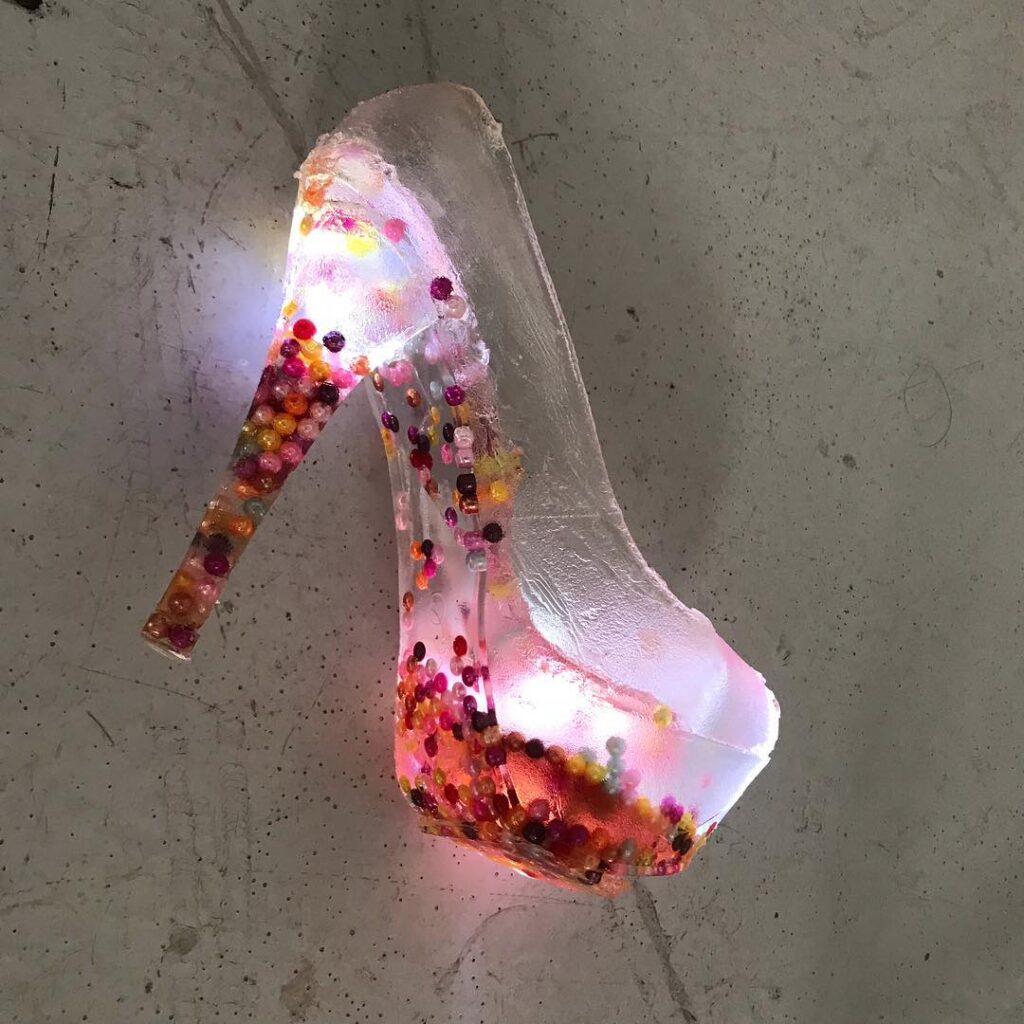
MBF: A hundred percent, and I think not only in the chess world. I have something to say about that. I am really quite optimistic because we are breaking the silence. I love the title of your podcast, and the introduction of season four made me feel like, “Okay, it’s my place to be here as a guest and share my story.” It’s just breaking the silence and providing that feeling of “I’m not alone.” And let’s talk about it and open those conversations. And my message to everyone is that it’s not only women who are victims. Men are victims, they have a really heavy weight. And one of my fights is really opening these dialogues, opening different perspectives, listening, and bringing empathy and compassion towards all women, homosexuals, trans people, girls, boys, all human beings. Bringing human beings to share what they feel, how they feel, and to be respectful of that.
I think it’s not a topic of women and men, it’s about different perspectives and the love of putting people and things into categories, you know? So the more we share, the more we talk, the more we open these possibilities for people. And I am really very positive because when I see the new generation today, I see my daughters, and what for you and me was a topic, it’s not even a topic for them. I am impressed. I really love it. We started cracking the ceiling, that’s for sure. You and me, we have our role for our generation and to make an impact for this future generation to make their foundation more solid. I am really quite optimistic about that, and I think that every single step we put here, you, me, and all the other people that are doing this, the results will be here. It will take time for sure, but I’m a very optimistic and positive person, so I see that side of the story.
AA: Well, that is a beautiful, beautiful way to close our conversation. It has been such a joy. You are such an inspiring person, Myriam.
MBF: Thank you so much.
AA: Thank you so much, Myriam Ben Farhat, for being here.
MBF: Thank you, Amy! It’s really an honor for me. Thank you.
When you are finally in a safe space,
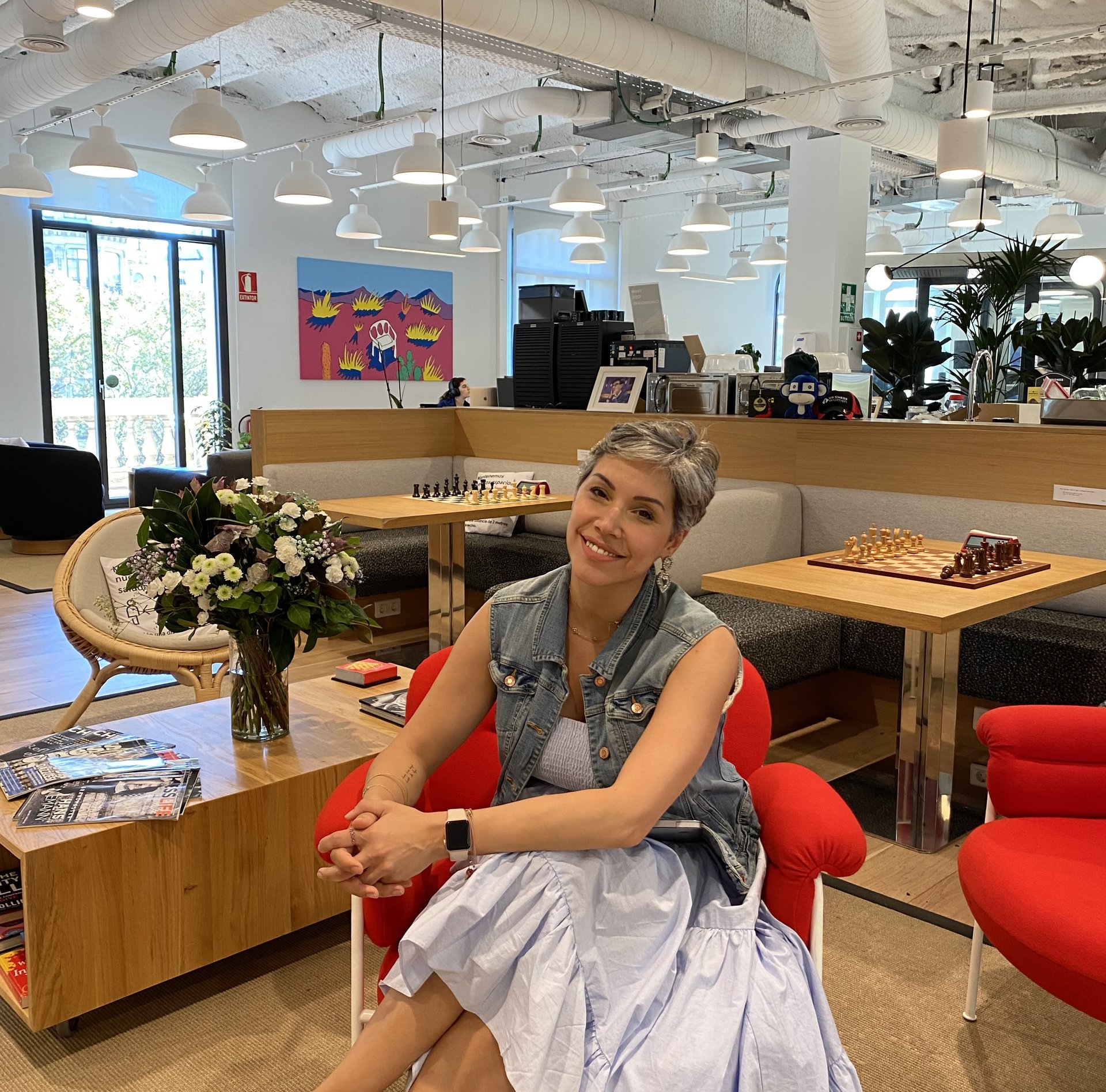
you realize that was a really heavy weight.
Listen to the Episode
&
Share your Comments with us below!

